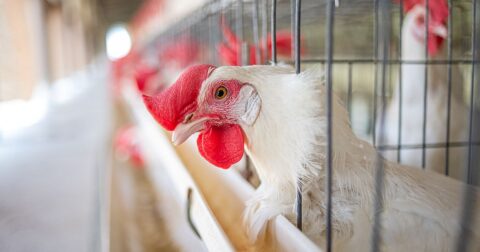Feature
Cattle Raised for Beef Are Heavier Than Ever, Raising New Concerns in the Industry About Animal Health and Welfare
Food•2 min read
Reported
A new report tracks progress among global brands pledging to source cage-free eggs.


Words by Grace Hussain
Dozens of companies have made commitments to improving animal welfare in their supply chain. Today, a new report from The Humane League and Open Wing Alliance tracks progress on cage-free commitments, and among some of the most well-known global restaurant brands.
The new report includes some big names — The Cheesecake Factory, Krispy Kreme, Ikea and Shake Shack among them. While all of the companies have made a commitment to source 100 percent cage free eggs — and most by 2025 — some brands are failing to report progress towards that goal.
The vast majority of companies are keeping their commitments — with 1097 out of 2500 already fulfilling agreements in their entirety.
What’s driving companies to make commitments in the first place? A combination of public pressure and effective corporate campaigns by organizations like The Humane League. Prior to the report’s release, the group was able to leverage the advance publicity to convince several restaurant chains — including Panda Express and Vapiano — to report progress and avoid being rated as lagging behind on their pledge.
In addition to campaigns by groups like The Humane League and Mercy For Animals (which published an accountability report earlier this year), consumers are also showing a strong preference for cage-free eggs.
This preference isn’t coming from just a handful of countries either. A survey of thousands of people from fourteen different countries found that a desire for cage-free eggs was almost universal.
Not only do consumers want more humane eggs, they’re willing to pay for them. Research funded by egg industry groups found that almost half of participants were willing to pay a premium for cage-free eggs.
An impressive 19 percent of their sample would pay as much as $15.71 for a dozen large, brown eggs that were not just cage-free but also labeled organic, free-range and pasture-raised.
It’s not just animal welfare making consumers prefer cage-free eggs either. According to Ashleigh Bright, PhD, an independent researcher, in China “people care about food safety and food quality,” even if “animal welfare is not [yet] such a priority.” Campaigns for cage-free living conditions for animals that focus on these other aspects of food production have been more effective, Bright argues.
Still, there is rising support for animal welfare in a number of countries, even in China where Bright is currently researching these issues. According to a report from Faunalytics, when it comes to broiler chickens and fish, virtually everyone the researchers talked to believed their quality of life should be improved.
Krispy Kreme did not respond to Sentient Media’s request for comment. A spokesperson for Ikea provided a statement to Sentient Media that reads in part: “IKEA is committed to humane and respectful treatment of animals and does not accept any form of animal cruelty,” referring to its corporate sustainability report here.
Several companies are failing to report progress toward their goal of a cage-free egg supply chain by 2025, including several major brands, among them The Cheesecake Factory and Shake Shack.
When Shake Shack originally announced their intent in 2015, the announcement was covered by numerous national media outlets including Eater and Huffpost. Six years later they became the first quick service restaurant to launch a timeline for their transition away from cage-free eggs in their global supply chain.
With their goal year of 2025 looming, they’ve “unfortunately” stopped reporting progress, says Hannah Surowinski, a spokesperson for The Humane League. “We need to ensure these companies are actually doing what they’re saying they’re doing,” she says.
According to the burger and shake chain’s website, they’ve already accomplished a cage-free supply chain in the United States, but the chain is “continuing to work to source cage-free eggs across our global supply chain.”
For Surowinski, that’s an issue of global equity. Consumers everywhere prefer cage-free eggs, so the shift should not be limited to the U.S., Canada or Europe. Originally opened in New York City, Shake Shacks can now be found in locations as far flung as China and the Middle East.
Shake Shack and The Cheesecake Factory did not respond to Sentient Media’s request for comment.
There are many reasons why a company might not report progress on a cage-free or other welfare commitment. One of the big ones, Bright says, may be cost. “Cage-free eggs are simply more expensive to produce than cage[d].” Cost is usually an even bigger motivator for companies that haven’t made any commitment, but it can be an issue for companies mid-transition as well.
None of the companies failing to report progress in this latest report have rescinded their commitment. According to Surowinski, their lack of progress could be due to something as simple as a lack of knowledge on how to make the transition, or logistical challenges with their global supply chains. Some companies could be concerned that their minimal progress would attract more bad publicity than not reporting at all.
The campaign will continue to check in with companies that have made a cage-free commitment, both privately and publicly. Says Surowinski, “we’ve got a long way to go in our work until every laying hen is free from cages.”
This piece has been updated to include a response from Ikea.